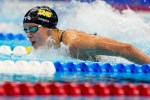IOC constraints ruin breakthrough
LONDON -- The slower she ran, the farther she trailed, the louder the ovation grew, the bigger the moment became, the more opportunity presented itself to Sarah Attar.
It would have been nice to hear her thoughts beyond a statement controlled by those who have concealed her from public view following the opening ceremonies.
If this were a relay, everyone would have dropped the baton.
What the International Olympic Committee wants you to believe and what is true are completely different ideals when it comes to inclusion for women at these games. More than an athlete whose participation might enact change, Attar resembles a major pawn in a public relations game the IOC wants to look good staging.
She ran a preliminary heat in the 800 meters here under the flag of Saudi Arabia, a cross country athlete who was born and raised in a suburb of San Diego, attends Pepperdine and whose life is far from the millions of Saudi women who are not allowed to participate in sports at any level or speak with unknown men or wear the sort of athletic attire the 19-year-old Attar does in Malibu.
She barely ran here, at that.
She finished last in 2 minutes, 44.95 seconds, nearly 44 seconds behind the heat's winner. But as she fell back more and more, adhering to Saudi demands of wearing a hood, long-sleeve top and leggings, the more those inside Olympic Stadium began to cheer.
They understood that in the big picture of Olympic spirit, time on a clock was of no consequence over witnessing the first female athlete to represent Saudi Arabia in track and field.
Sad. It could have been so much more.
Attar gave a quick statement to officials afterward about being honored to represent the women of Saudi Arabia in such a historic moment and it being such a huge step forward.
I'm not sure about the last part.
Change begins with honest dialogue. You can't place conditions on it and expect barriers to come down. While the Islamic nations of Saudi Arabia, Qatar and Brunei fielding female athletes in the Olympics for the first time makes this a memorable event, Attar's refusal or inability to expound on her presence makes for an empty feeling.
That she spoke some with NBC following her race also left many wondering if this was more about change or herself.
Attar is not Wojdan Shaherkani, the 16-year-old judo athlete from Saudi Arabia who lasted 82 seconds in her only match, who shook with fright while addressing reporters and standing next to an IOC official monitoring her comments, who now must return to a life of restricted rights and walking behind men wearing her hijab.
That's courage. That's grace under an inferno.
Attar swept through a mixed zone of hundreds of reporters awaiting her alone and faster than she had just run her race. She could have stopped and, in a respectful manner to all parties involved, described her feelings about the moment, about how she has handled her selection following strict international pressure on Saudi Arabia to include women on their team.
Her mother is American and her father Saudi Arabian, which allows her a perspective that might open eyes not willing before now to see the importance of basic human rights.
Her words could have carried much weight.
Those closest to Attar say the IOC instructed her not to talk here beyond short statements, of which the organization typically denied to reporters this week.
The point: While it's a significant example of needed progress that all 204 nations here are represented with female athletes when considering 26 weren't just 16 years ago in Atlanta, empowerment can't be achieved under a cloud of restraint. You can't fake these things and expect the world to buy it.
"I think it's sad how" women are treated in Saudi Arabia, said Neisha Bernard-Thomas of Grenada, who ran in Attar's heat. "We should all have equal rights. We should be a free people. Hopefully, they will allow it more, not just at these games."
One woman became a single figure slowly rounding a track here Wednesday, thousands encouraging her every labored step, a symbol in many eyes of how the Olympics can alter the planet for the better.
It could have been one the greatest moments in the history of the games ... if it didn't fall so flat.
Sarah Attar gave the Olympics something it hasn't had before.
But while she made a statement on the track, there wasn't much of one off it, where change truly might have stood a chance.
Las Vegas Review-Journal sports columnist Ed Graney can be reached at egraney@reviewjournal.com or 702-383-4618. He can be heard from 11 a.m. to 2 p.m. Monday through Friday on "Gridlock," ESPN 1100 AM and 98.9 FM. Follow him on Twitter: @edgraney.




























